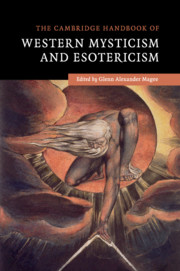Book contents
- Frontmatter
- Dedication
- Contents
- Acknowledgments
- Editor's Introduction
- List of contributors
- I ANTIQUITY
- II THE MIDDLE AGES
- III THE RENAISSANCE AND EARLY MODERNITY
- IV THE NINETEENTH CENTURY AND BEYOND
- 20 Spiritualism
- 21 H. P. Blavatsky and Theosophy
- 22 Rudolf Steiner and Anthroposophy
- 23 The Golden Dawn and the O.T.O.
- 24 G. I. Gurdjieff and the Fourth Way
- 25 C. G. Jung and Jungianism
- 26 René Guénon and Traditionalism
- 27 Via Negativa in the Twentieth Century
- 28 Contemporary Paganism
- 29 The New Age
- V COMMON THREADS
- Suggestions for Further Reading
- Index
- References
24 - G. I. Gurdjieff and the Fourth Way
from IV - THE NINETEENTH CENTURY AND BEYOND
Published online by Cambridge University Press: 05 May 2016
- Frontmatter
- Dedication
- Contents
- Acknowledgments
- Editor's Introduction
- List of contributors
- I ANTIQUITY
- II THE MIDDLE AGES
- III THE RENAISSANCE AND EARLY MODERNITY
- IV THE NINETEENTH CENTURY AND BEYOND
- 20 Spiritualism
- 21 H. P. Blavatsky and Theosophy
- 22 Rudolf Steiner and Anthroposophy
- 23 The Golden Dawn and the O.T.O.
- 24 G. I. Gurdjieff and the Fourth Way
- 25 C. G. Jung and Jungianism
- 26 René Guénon and Traditionalism
- 27 Via Negativa in the Twentieth Century
- 28 Contemporary Paganism
- 29 The New Age
- V COMMON THREADS
- Suggestions for Further Reading
- Index
- References
Summary
Life, Writings, and Influence
As is the case with many figures in Western esotericism, the life of George Ivanovich Gurdjieff is shrouded in both mystery and controversy. Seen by some as a sage and others as a charlatan, he is arguably the most influential esoteric teacher of the twentieth century. As we shall see, whether we are approaching Gurdjieff's life, writings, teachings, or legacy, there are no easy answers to be found.
We are not even certain when Gurdjieff was born, but it was likely January 13, ca. 1866. The place of birth was definitely Alexandropol, which at the time was part of the Russian Empire. Gurdjieff's father was Greek, his mother Armenian. The family name was originally Georgiades and was later Slavicized as Gurdjieff. When he was quite young, Gurdjieff's family resettled in Kars near the Turkish border, which had once been part of the Ottoman Empire but was then under Russian control. Because of its location and rich history, Kars exposed the young Gurdjieff to a great variety of cultures and faiths. Meetings with Remarkable Men, Gurdjieff's most accessible work, is our chief source of information on his early life, and it contains a number of fascinating stories about his experiences in this mysterious region.
Gurdjieff's father was an ashiq, or balladeer, and was a strong influence on him. His parents raised him in the Eastern Orthodox faith, whose theology is almost entirely “mystical,” and it is clear that this was a strong influence as well. However, Gurdjieff was no admirer of organized religion, and in later life expressed strong antipathy to the clergy. From a young age, he reacted against both the tendency to rationalism and reductionism in the modern outlook, and the unquestioning faith demanded by religion.
In early adulthood, Gurdjieff set off on what would become roughly two decades of travels, journeying throughout Central Asia and the Middle East in search of wisdom. Our chief source for this period in his life is, again, Meetings. Though it must be acknowledged that this is a flawed source, for it contains some anecdotes that strain credulity. Precisely because of this, and because Meetings does not fill in all the gaps, there has been a great deal of speculation about Gurdjieff's activities during this time.
- Type
- Chapter
- Information
- The Cambridge Handbook of Western Mysticism and Esotericism , pp. 284 - 296Publisher: Cambridge University PressPrint publication year: 2016



